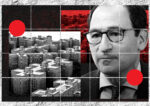Landlords dodged good cause eviction, but lawmakers are considering another bill that would potentially “open the floodgates” for rent overcharge cases.
The measure seeks to make it easier for tenants to show past rent overcharges amounted to fraud, which would lead to huge payouts for violations committed years ago — even by previous owners.
“Especially with some of the court decisions that have come out, it’s getting increasingly difficult to prove the landlord’s fraudulent intent to increase the rent or deregulate the apartment,” Ellen Davidson of the Legal Aid Society, told City Limits.
The Community Housing Improvement Program on Friday accused Sen. Brian Kavanagh and Assembly member Linda Rosenthal, who chair the housing committees in their respective chambers, of quietly pushing for the measure during the final hours of the legislative session.
“This bill is about punishing property owners. Plain and simple,” Jay Martin, CHIP’s executive director, said in a statement. “The changes in the rent laws in 2019 were about deterring future fraud, not creating a scheme where owners are guilty until proven innocent.”
The measure, and another that seeks to give tenants more access to their units’ rent histories, were debated in the waning hours of the legislative session. The Senate passed the bill to increase access to rent histories Friday evening, and was expected to take up the other measure later on.
Legislators had planned to adjourn for the year on Thursday, but stayed in Albany another day, leaving lobbyists and journalists scrambling to figure out what they were up to.
CHIP claims that the bill seeks to unravel a landmark 2020 state Court of Appeals decision, along with subsequent rulings. The 2020 case found that the 2019 rent law could not be applied retroactively to rent overcharge cases.
It also determined that rent owed to tenants in overcharge cases predating the 2019 law must be calculated based on a four-year lookback unless the landlord schemed to illegally deregulate units.
In those cases, if tenants had evidence of fraud, they could consult rental history beyond the usual four years before their complaint. If it is determined that fraud occurred, the overcharge is calculated using a “default formula,” which relies on the lowest stabilized rent recorded for comparable apartments, rather than determining the base rent on a four-year lookback.
The measure defines fraud as “a material breach of any duty… to disclose truthfully…the rent, regulatory status, or lease information,” in order to deregulate or unlawfully increase the rent, whether or not the fraud was intentional, and regardless of whether a tenant “specifically relied on untruthful or misleading statements in registrations, leases, or other documents.”
Under the bill, fraud includes wrongfully deregulating an apartment “unless the landlord can prove good faith reliance on a directive or ruling by an administrative agency or court.” Fraud also includes failing to register an apartment in a building receiving J-51 or 421a after Oct. 1, 2011.
That 2011 date seems to reflect a 2009 ruling that the owners of Stuyvesant Town and Peter Cooper Village could not deregulate units while receiving J-51 benefits, despite state guidance around luxury decontrol that suggested otherwise.
Deborah Riegel, an attorney with Rosenberg & Estis who argued before the Court of Appeals on behalf of a property owner in the 2020 case, said the new measure’s definition of fraud is overly broad. She said “any mistake” made by a landlord would be deemed fraud.
“In every overcharge case, there is a claim that the landlord did wrong,” she said.
“It’s chaos for the industry. And nobody will have any idea of what rents should be,” she added. “It potentially opens up the floodgates, and leaves owners with tremendous liability.”
She said the heightened liability in overcharge cases and other aspects of the bill would also scare away lenders.
The measure would also require owners of buildings that have been exempt from rent stabilization due to substantial rehabilitation to submit applications to the state’s housing regulator within six months of the bill passing.
That means buildings that have been exempt for decades would need to apply for exemption to rent regulation. Newly rehabilitated buildings would need to submit an application within one year of completing work.
The bill further seeks to create rules for setting rents for newly combined rent-stabilized units, similar to regulations proposed by the state’s housing regulator last year.
News of the measure’s emergence came after lawmakers announced that they were not moving forward with a larger housing package that included a 421a extension and good cause eviction.
Read more



